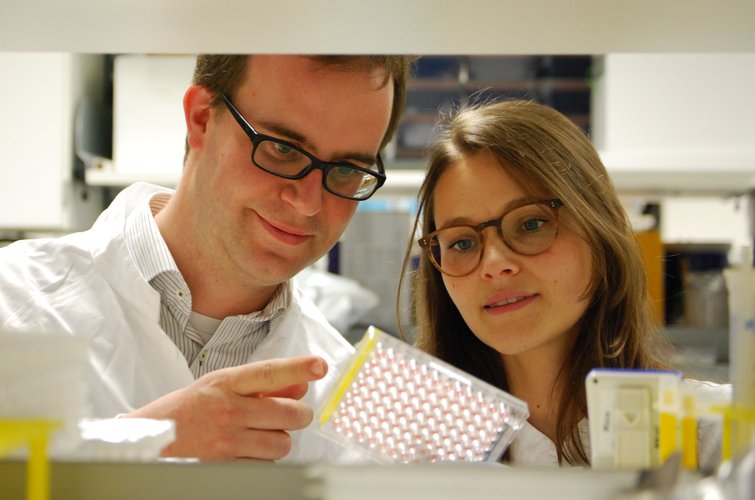Biallelic loss-of-function mutation in NIK causes a primary immunodeficiency with multifaceted aberrant lymphoid immunity
Share
The team of Kaan Boztug, Principal Investigator at CeMM and Assistant Professor at the Department of Pediatrics and Adolescent Medicine of the Medical University of Vienna discovered the molecular origin of a new rare disease and succeeded in deciphering the essential role of the NFkB-inducing kinase (NIK) for an efficient immune response in humans. The findings have been published online, on November 19th, 2014, in the open access journal Nature Communications.
Primary immunodeficiencies are inherited disorders resulting in malfunction of the immune system. The identification of the molecular defects underlying these disorders is crucial not only to diagnose patients and enable targeted therapies, but also highlights essential components and pathways in human immunity in general. The research team under the supervision of Kaan Boztug has now uncovered a novel, rare form of primary immunodeficiency, and identified a loss-of-function mutation in the gene NIK as the underlying genetic cause for this disorder.
In their publication, first author Katharina Willmann and her colleagues at CeMM and the Medical University decipher the essential role of NFkB-inducing kinase (NIK), a central kinase involved in non-canonical NFkB signaling, for an efficient immune response in humans. Usually, the signaling molecule NIK is expressed in lymphoid cells of the immune system. However, the variant they found in the patients is enzymatically inactive and therefore unable to transmit signals necessary to mount an appropriate immune response. Human NIK deficiency not only leads to defective B-lymphocytes that cannot produce antibodies appropriately. The scientists discovered that also T-lymphocytes, which specialize in memorizing and recognizing specific pathogens, as well as the so-called natural killer cells, which specialize in killing virus infected body cells, were affected in their functions. Together, these defects have a profound and devastating effect on the defense mechanisms of the patients.
By identifying the signaling molecule NIK as a crucial player in a functional immune defense, the team of Kaan Boztug uncovered a central molecular mechanism of the human immune system. These findings will not only help to understand signaling in the human immune system better but will, in the long run, also enable scientists to develop molecular therapeutic approaches.
Publication: Biallelic loss-of-function mutation in NIK causes a primary immunodeficiency with multifaceted aberrant lymphoid immunity. Katharina L. Willmann, Stefanie Klaver, Figen Doğu, Elisangela Santos-Valente, Wojciech Garncarz, Ivan Bilic, Emily Mace, Elisabeth Salzer, Cecilia Domínguez Conde, Heiko Sic, Peter Májek, Pinaki P. Banerjee, Gregory I. Vladimer, Sule Haskoloğlu, Musa Gökalp Bolkent, Alphan Küpesiz, Antonio Condino-Neto, Jacques Colinge, Giulio Superti-Furga, Winfried F. Pickl, Menno C. van Zelm, Hermann Eibel, Jordan S. Orange, Aydan Ikincioğulları & Kaan Boztug. DOI:10.1038/ncomms6360

